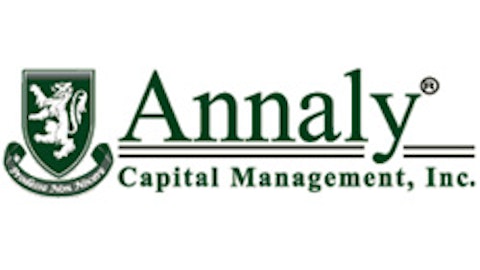Capstead Mortgage Corporation (NYSE:CMO) disclosed its performance for the first quarter of the current year. The first quarter of this year was marked by mortgage rates that climbed since the beginning of the year, while the weekly Mortgage Bankers Association reported a slowdown in refinance activities. Besides, the Fed was busy stimulating the US economy and the housing sector in particular. The remainder of the investment thesis will attempt to find out whether Capstead has been able to benefit from the favorable mortgage market data.
Capstead Mortgage Corporation
Capstead Mortgage Corporation (NYSE:CMO) operates in the US financial sector as a mortgage REIT that largely invests in adjustable rate residential mortgage backed securities (ARMs) for which any of the government agencies guaranteed the principal and interest payments. The company reported an EPS of $0.31, $0.01 shy of the consensus mean estimate.
Financials
A quick year over year comparison reveals that Capstead Mortgage Corporation (NYSE:CMO) experienced difficulties during the first quarter of the current year. However, when looked at in detail you will find out that it did benefit from the higher mortgage rates and slowdown in refinancing during the first quarter.

However, the 32% year over year decline in the quarter’s operating expenses provided some support to the bottom line. The total expenses for the first quarter of the current year came in at $3.07 million, down from the prior year’s $4.5 million. Much of the decline was a result of less incentive compensation and salaries and benefits, partially offset by higher other general and administrative expenses. It is worth nothing here that operating costs as a percentage of the long-term investment capital decreased 2 bps to 0.77%.
As a result, the net income for the first quarter of the current year came in at $34.9 million, down 23% over the same quarter of the prior year. The income per share decreased from $0.45 per share to $0.31 per share over the same time period. This is compared to a quarterly dividend rate of $0.31 per share, which the company is paying to its shareholders.
Asset Yield, Cost of Funds and Financing Spread
During the quarter, the yields on Capstead’s residential mortgage investments averaged 1.73%, down 3 bps from the linked quarter. The yield was down 41 bps over the prior year. However, during the quarter, Capstead paid less on its interest bearing liabilities as its adjusted borrowing cost (cost of funds) declined 5 bps quarter over quarter or 9 bps year over year. As a result, the company was able to post a net interest rate margin of 1.15%, up 2 bps sequentially. Still, the margin was down 50 bps from a year ago.
Prepayments and Amortization
Prepayments are payments made before the maturity date. Refinancing tends to accelerate prepayments. When prepayments accelerate, mortgage REITs like Capstead Mortgage Corporation (NYSE:CMO) are forced to recognize amortization expense on their Agency MBS because Agency MBS are mostly purchased above par. As noted in the beginning, refinancing activity slowed down during the first quarter. However, due to the nature of the investment portfolio, Capstead Mortgage was not able to take full advantage of this and reported a CPR of 19.65%, up 5 bps over the linked quarter. The company recognized $28.4 million in amortization expense during the quarter.

